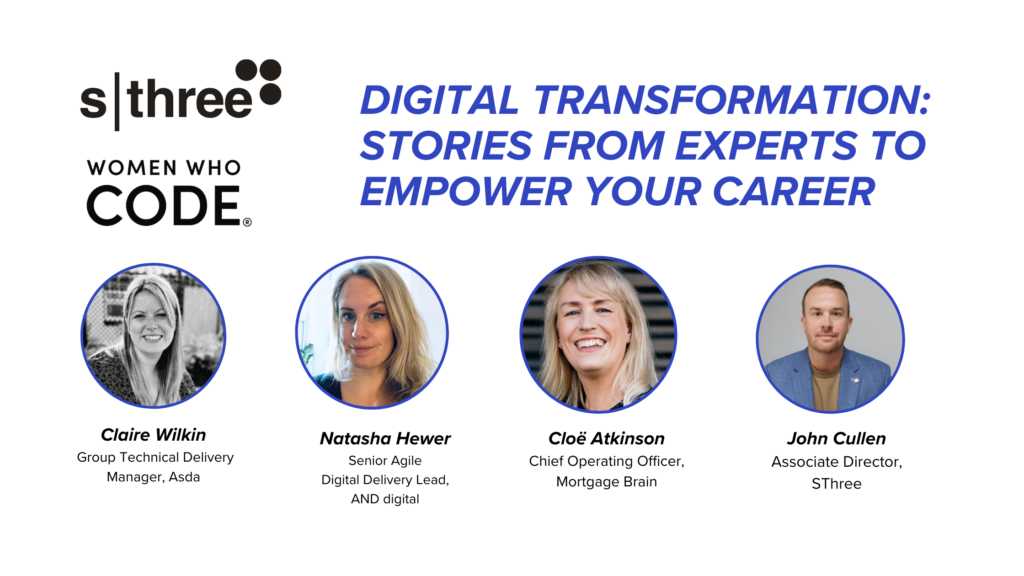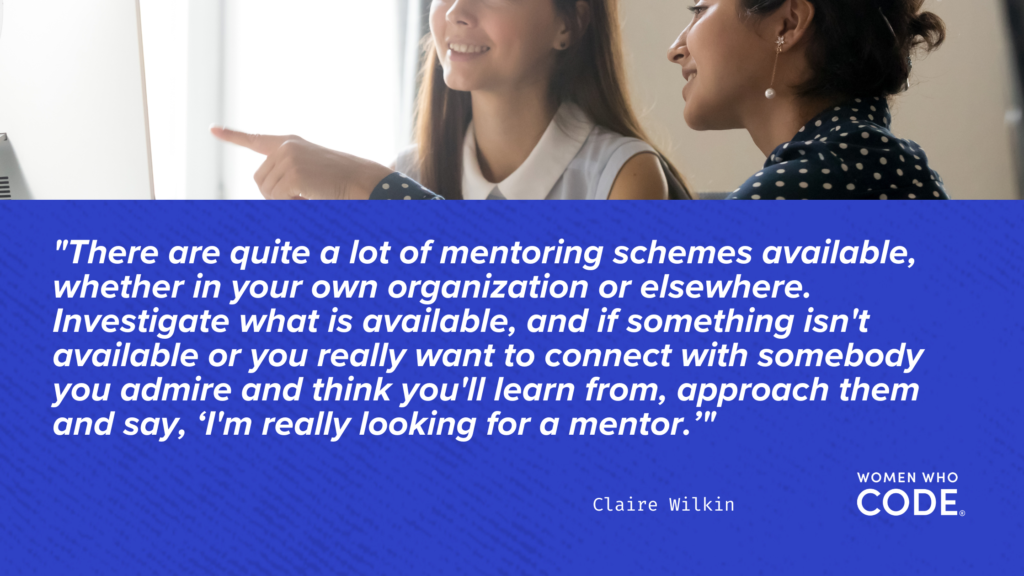Digital Transformation: Stories from Experts to Empower Your Career with SThree
Written by Women Who Code
This article has been adapted from the recording of our event, “Digital Transformation: Stories from Experts to Empower Your Career with SThree.“

Watch or Listen to this Panel on YouTube
John Cullen, Associate Director of SThree in Manchester, moderates the discussion, “Digital Transformation: Stories from Experts to Empower Your Career with SThree.” Joining John is Claire Wilkin, Delivery Manager in e-commerce at ASDA, Natasha Hewer, Senior Product Delivery at AND Digital, and Cloë Atkinson, Chief Operating Officer at Mortgage Brain.
JC: Claire, as overseeing the Walmart and ASDA transition, give your thoughts on what you see digital transformation as.
CW: There are two lenses. Digital transformation is where you’re delivering a significant impact to the business through new digital technologies. What it means for me and how it’s changed my world is that digital transformation is much more about how we deliver. You’ve got to acknowledge that you’re not going to have a set plan that you can work with immediately. You’ve got to dissect it, pivot where need be, be flexible, and understand that you’ve got an endpoint. The path to that endpoint isn’t quite as linear as you might think it would be.
JC: What unexpected turns did your career take to get you into the position that you’re in currently?
CA: I’ve had a fairly unconventional career. I started as a graduate accountant in a bank and took a role in looking after the finances and auditing for the mortgage division. I was looking at how that business worked and spotted a gap where technology could solve a problem. I started to formulate an idea of actually moving into more of a technology space and being able to create a business that would help not only our bank but also the industry. I started to do some of the things I had to do to make that transition. I went on to learn to code.
CW: My degree was in history. I never thought I’d be in a technology department and running a team that way. It’s just how events in my career have taken on, and technology, particularly in the digital space, has become more and more prevalent. You get a knock, and you start exploring something. You get an interest, and then it snowballs from there.
JC: What skills did you learn quickly on the job to succeed?
NH: I did a theater degree, so I never thought I’d end up working in tech. I just pivoted through operational management. I’m going to focus my answer on what you need to know other than tech. This industry requires really t-shaped individuals. You either come in with no tech knowledge, in which case you’ve got to learn quickly and find your network, or alternatively, you come in with a great deal of tech knowledge. Within digital transformation, the needed skills are great communication skills. You need to be disruptive and challenge the status quo, but you need to be able to do that in a way that is palatable to the people that you’re speaking to. If you’re in a leadership role, you must have a clear vision and communicate to people where you want to go.
JC: How did you go about finding mentors and allies at work to help you?
CA: I’ve had lots of different mentors over the course of my career. Early on, my aunt was a role model for me, and she was like an early mentor. I’ve had really formal mentors assigned to me when I worked at the bank. We had formal relationships and met at set times. It was good for career progression and discussing where I wanted to go. One of the things that helped me make my previous business, Mortgage Engine, successful was creating a wide range of people to whom I talked. I had a wide range of people and tried to pick different people with different skill sets and opinions to talk to about different topics and get wide-ranging opinions on different issues. I always would say, “Can I take you for a coffee? Can I buy you a glass of wine?” It needs to be a reciprocal arrangement; also, make sure you’ve got a clear idea about what you want to talk about and be upfront about that with them. Be honest, understand what it is you want to get out of it, and have that conversation relatively directly.
CW: There are quite a lot of mentoring schemes available, whether in your own organization or elsewhere. Investigate what is available, and if something isn’t available or you really want to connect with somebody you admire and think you’ll learn from, approach them and say, “I’m really looking for a mentor.” If they don’t have the capacity, they could recommend someone else who is suitable in that respect. Be brave and go out there and seek people where possible.

JC: How do you currently go about facing uncertainty in such a rapidly evolving field?
NH: Be resilient. It’s an uncertain field; it’s really important to know how you react when you are stressed. If you’ve been working on something and you feel uncertain, work out who your network is. That’s going to give you some confidence. For me, it’s about accepting that it is uncertain, but you can be prepared for it both personally and professionally. That’s the best way to work.
CA: You have to be an individual that can cope. The reality is it’s a job. It’s work. We’re not brain surgeons. We’re not performing life-saving operations. You have to be able to divide things up, use the energy when you need it, be focused, get it done, and then go home.
JC: At this point in your career, what challenges are you wrestling with as you work to position yourself as a thought leader in the industry?
CW: It’s been a very challenging program. I’ve been working on this program for two and a half years. One of the key challenges that we’re facing is that we’ve got a business that still needs to perform, meet our customer needs, and still needs to be maintained; at the same time, it’s almost like we’re doing a startup, and starting afresh with regards to all of our systems. One of the other challenges we need help with is that we’ve got a range of new products we are working with. They’re changing all the time as well. They’ve got upgrades that we need to accommodate. AI is obviously becoming a hot dynamic, and there’s some really good stuff that it can do and produce—lots of moving parts that are going on at the same time.